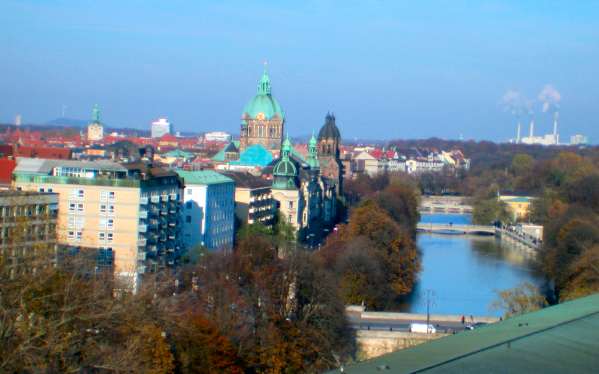
Munich: San Francisco without the garbage or bums

This is the Isar River seen from the Deutsches Museum. Downtown Munich is clean and has a mixture of old and new buildings. A travel book said after the bombing of World War II that Munich residents insisted on rebuilding the bombed parts to look like the city before the bombing. Amy's apartment is near here, a few blocks to the left of the bridge in the foreground.
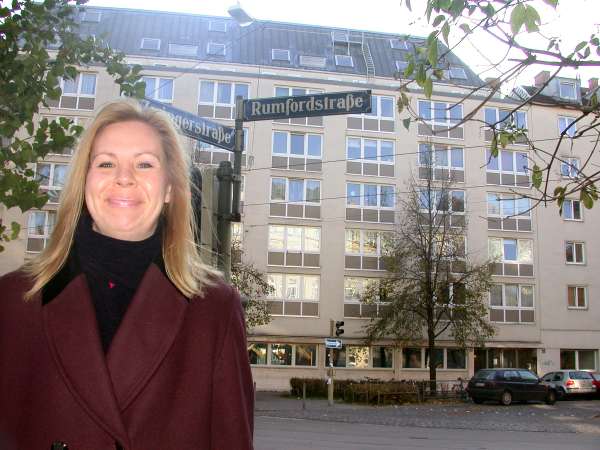
Amy is standing in front of her apartment building. That's her room two windows below the Rumfordstrasse sign. Trolley cars go down Rumfordstrasse and Amy said they bothered her, but they never bothered me. Of course, I grew up a couple of hundred of feet from a train yard where they coupled and uncoupled trains all night.
Since we're talking about Munich, I have to go on another rant here. Growing up in the United States, I drank what we here call beer, but I wouldn't call myself a beer drinker. Munich is one of the beer capitals of the world. Another place we visited, Prague, invented pilsner beer. Folks, I'm here to tell you, after drinking beer in Munich and Prague, we have to come up with another name for the brew sold in the United States. Nothing against the good folks at Budweiser, Miller, Pabst, etc. But the beer there is in another league. Each time I drank a different one, it became my favorite.
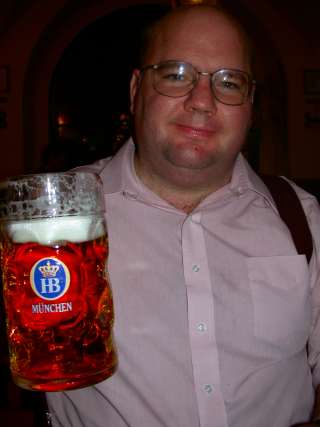
My last night there, I ate at a restaurant to Amy's right in the photograph above, just across the street, while Amy had to work. They serve a beer called Augustiner, which its brewers trace back to 1328 when monks brewed the first batch. They tout themselves as the oldest brewery in Munich. I drank a dunkel, or a dark, heavy brew. The beer was fantastic. I don't know how to explain it, except that it had a great, rich flavor. My strongest impression of American beer is that it makes me burp. And even though I drank only a half liter of Augustiner dunkel and ate a full meal (sausages mit kraut), I got absolutely hammered. Afterwards I went back to Amy's apartment and tried packing but the four dials on my luggage locks had me absolutely stumped.
Munich, of course, has the world's most famous
beer hall, the Hofbrauhaus. As soon as I arrived Amy took me on a tour of
downtown Munich and then took me to the Hofbrauhaus. They had a nice polka band
and a few people were dressed in Bavarian garb. And they have beer. Fellow
reporter Don Cox told me about the Hofbrauhaus, which is about a 10-minute walk
from Amy's apartment. Amy knew of it too and we went there and ordered a liter of beer for each of
us. Neither of us could finish. I can blame my failure on 16 hours of travel
and a desperate need for sleep. I know I let down Don Cox.
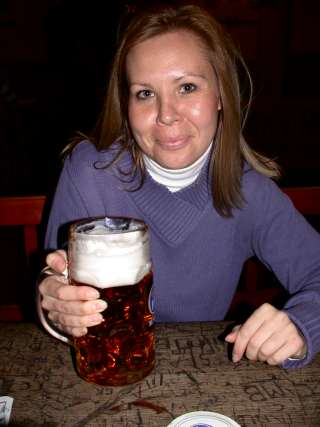
There's something else Munich has that makes the American equivalent pale. They have bakeries on just about every corner in downtown Munich. Forget the mass produced, heavily packaged baked goods they sell in United States supermarkets. All the bread is fresh there. The rolls, the croissants, everything. Even the equivalent of the 99 cent stores have bakeries that put U.S. bakeries to shame.
The prices in Munich bakeries were reasonable and the quality was usually excellent. We have a billion Starbucks in the United States pushing caffeine. Maybe we need to put something addictive into bread to get more bakeries.
And while we're on the topic of Munich food, I have to mention my favorite gustatory place in Munich: The Viktualienmarkt. It's an open-air market about five minutes from Amy's apartment. It has all kinds of food and little knick knacks, but my favorite were the olives. There were a couple of stands selling a dozen or more kinds of olives. They had olives from Italy, from Spain, from Greece. They come with a variety of seasonings. Knoblauch isn't just an errant throwing second baseman for the Yankees. It also means garlic in German. Fortunately for me, my favorite olives, Spanish olives with picante (to the immediate left of the yellowish bottle of olive oil) were also the cheapest, about a buck per 3 1/2 ounces. The receipt shows I paid 6 marks, 13 pfennig (about $3) for 300 grams of olives my second day in Munich.
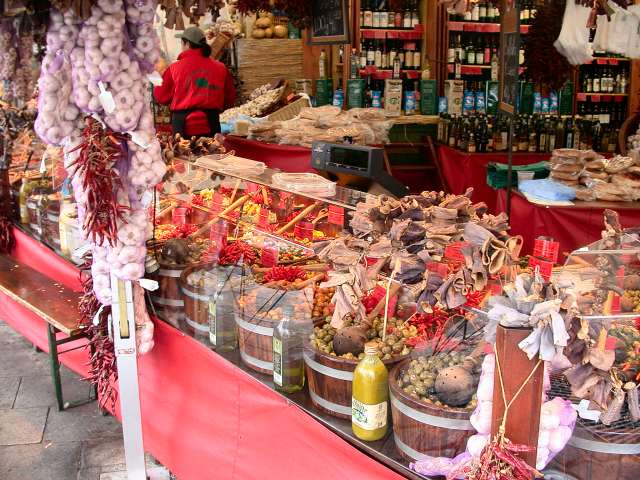
Here's a link to a live web cam at the Viktualienmarkt.
Language was not as big of a problem as I imagined. I studied German in high school and college, but my German was very poor. About 10 years ago a tour bus with a lot of German speakers crashed in California near Reno. I went to interview the survivors at a Reno hospital and we used the German-born boyfriend of a newsroom clerk to translate. I tried my German on him and he wasn't even polite. It stunk and he insisted I tried not to speak it any more. So I had little expectations of speaking the language there. Most people I encountered spoke English. I needed special batteries for my camera and at one department store I studied the batteries carefully to find out the price. A salesman walked up to me and asked if he could help. I stammered out "battery" and then rifled my brain for the correct way to pronounce the identification 2CR5 in German. "Zwei," I said and my brain locked up as I tried to remember how to say "C." So I mumbled the German alphabet under my breath: "Ah, bey, tsay" and then said the identification: "Zwei tsay ahr funf." The salesman went to great effort to unlock the cabinet and pull out the equivalent battery. I didn't really want to buy it. I only wanted to price it. But it would really spike my language triumph to walk away at this time, so I pulled out my credit card.
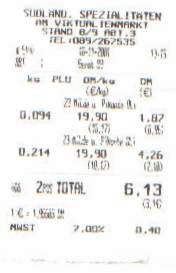
People easily identified me as an American. One guy who had been talking German accidentally backed into me at the Deutches Museum and before I said anything said, "Pardon me." I guess the suspenders and tennis shoes are a dead give away. My last day there I tried on my own to find a photo store near Sendlinger Tor. I was lost and found a well-dressed woman walking down the sidewalk. In my best German, I tried to ask the location of Sendlinger Tor. She brushed off my German, pointed down the street and said, "300 meters that way." I had serious problems processing even the simplest German phrases. Amy and I took the night train to Prague with a New Yorker and a German couple. We had lifted up a middle sleeper bed so Amy and I could sit on the bottom bed like a chair. The German guy said something in German and my brain was trying to process what he said. I felt a soft thud on the back of my head as the sleeper bed unhooked and fell. Shortly after that, I translated his word, "Achtung," as "attention!"
My other photos of Munich are below. One photo shows a sleeping baby and a dog on a subway. I included that photo to show people take their dogs everywhere in Germany: into many restaurants and into major department stores, the equivalent of the Munich Macy's. By the way, I asked Amy to ask the woman with this kid if I could take her picture and Amy just about died of embarrassment.
Click on the thumbnail below to enlarge the photograph.
Go back to the table of contents page